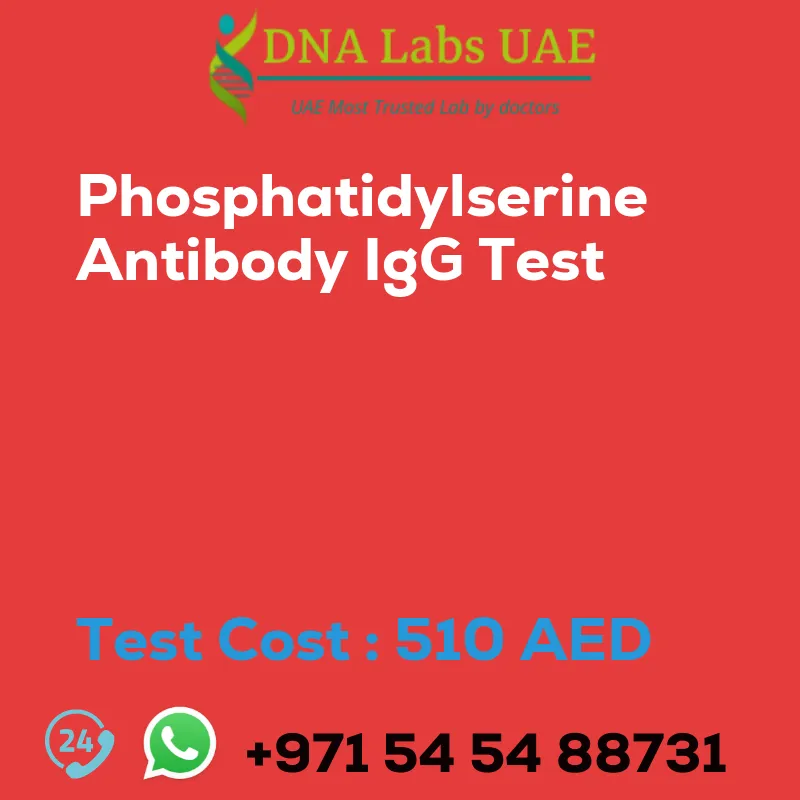PHOSPHATIDYLSERINE ANTIBODY IgG Test
Test Name: PHOSPHATIDYLSERINE ANTIBODY IgG Test
Components: Price 510.0 AED
Sample Condition: 2 mL (1 mL min.) serum from 1 SST. Ship refrigerated or frozen.
Report Delivery: Sample Tue by 11 am; Report Fri
Method: Enzyme Immunoassay
Test type: Thromboembolic disorders, Abortions
Doctor: Gynecologist, Hematologist
Test Department:
Pre Test Information: No special preparation required
Test Details:
The Phosphatidylserine Antibody IgG test is a laboratory test that measures the level of IgG antibodies against phosphatidylserine in the blood. Phosphatidylserine is a phospholipid that is normally found on the inner side of cell membranes. However, in certain autoimmune disorders, the immune system mistakenly produces antibodies against phosphatidylserine, leading to an increased risk of blood clot formation.
The test is primarily used to help diagnose and monitor autoimmune disorders such as antiphospholipid syndrome (APS) and systemic lupus erythematosus (SLE). APS is a condition characterized by the presence of phospholipid antibodies and an increased risk of blood clots in veins and arteries. SLE is a chronic autoimmune disease that can affect various organs and tissues.
The Phosphatidylserine Antibody IgG test is typically ordered when a person has symptoms suggestive of APS or SLE, such as recurrent blood clots, miscarriages, or unexplained symptoms affecting multiple organs. It may also be ordered to monitor the effectiveness of treatment for APS or SLE.
During the test, a blood sample is drawn from a vein in the arm. The sample is then sent to a laboratory for analysis. The results are usually reported as a numerical value indicating the level of IgG antibodies against phosphatidylserine in the blood. Elevated levels of these antibodies may suggest the presence of APS or SLE.
It is important to note that the Phosphatidylserine Antibody IgG test is just one component of a comprehensive evaluation for autoimmune disorders. It should be interpreted in conjunction with the person’s clinical history, symptoms, and other laboratory tests. A healthcare provider is best equipped to interpret the results and make a diagnosis.
| Test Name | PHOSPHATIDYLSERINE ANTIBODY IgG Test |
|---|---|
| Components | |
| Price | 510.0 AED |
| Sample Condition | 2 mL (1 mL min.) serum from 1 SST. Ship refrigerated or frozen. |
| Report Delivery | Sample Tue by 11 am; Report Fri |
| Method | Enzyme Immunoassay |
| Test type | Thromboembolic disorders, Abortions |
| Doctor | Gynecologist, Hematologist |
| Test Department: | |
| Pre Test Information | No special preparation required |
| Test Details |
The Phosphatidylserine Antibody IgG test is a laboratory test that measures the level of IgG antibodies against phosphatidylserine in the blood. Phosphatidylserine is a phospholipid that is normally found on the inner side of cell membranes. However, in certain autoimmune disorders, the immune system mistakenly produces antibodies against phosphatidylserine, leading to an increased risk of blood clot formation. The test is primarily used to help diagnose and monitor autoimmune disorders such as antiphospholipid syndrome (APS) and systemic lupus erythematosus (SLE). APS is a condition characterized by the presence of phospholipid antibodies and an increased risk of blood clots in veins and arteries. SLE is a chronic autoimmune disease that can affect various organs and tissues. The Phosphatidylserine Antibody IgG test is typically ordered when a person has symptoms suggestive of APS or SLE, such as recurrent blood clots, miscarriages, or unexplained symptoms affecting multiple organs. It may also be ordered to monitor the effectiveness of treatment for APS or SLE. During the test, a blood sample is drawn from a vein in the arm. The sample is then sent to a laboratory for analysis. The results are usually reported as a numerical value indicating the level of IgG antibodies against phosphatidylserine in the blood. Elevated levels of these antibodies may suggest the presence of APS or SLE. It is important to note that the Phosphatidylserine Antibody IgG test is just one component of a comprehensive evaluation for autoimmune disorders. It should be interpreted in conjunction with the person’s clinical history, symptoms, and other laboratory tests. A healthcare provider is best equipped to interpret the results and make a diagnosis. |








